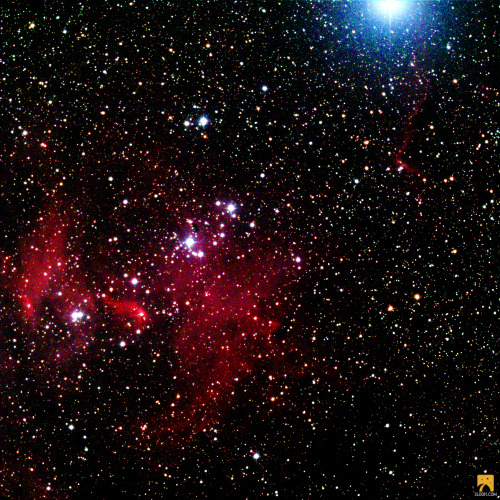This Is The Cat’s Paw Nebula! 🐾🐾🐾

This is the Cat’s Paw Nebula! 🐾🐾🐾
This nebula is glowing due to the interactions between its hot stars and large molecules known as polycyclic aromatic hydrocarbons. This makes it particularly bright in the infrared and a common target for astrophotography in the Milky Way galaxy! 🔭🔭🔭
Taken by me (Michelle Park) using the Slooh Chile Two telescope on March 7th, 2021 at 6:38 UTC.
More Posts from Mystarypi and Others


I want you to cry for me ~ 🎶 Twice’s new song is so good! ToT
print shop





Puppy galore! 🐶🐾

Eye in the sky by europeanspaceagency
One of my favorite nebulae ♥♥♥ It looks so beautiful 🥰🥰🥰

NGC 6357: Cathedral to Massive Stars via NASA https://ift.tt/31D4Lqn
How massive can a normal star be? Estimates made from distance, brightness and standard solar models had given one star in the open cluster Pismis 24 over 200 times the mass of our Sun, making it one of the most massive stars known. This star is the brightest object located just above the gas front in the featured image. Close inspection of images taken with the Hubble Space Telescope, however, have shown that Pismis 24-1 derives its brilliant luminosity not from a single star but from three at least. Component stars would still remain near 100 solar masses, making them among the more massive stars currently on record. Toward the bottom of the image, stars are still forming in the associated emission nebula NGC 6357. Appearing perhaps like a Gothic cathedral, energetic stars near the center appear to be breaking out and illuminating a spectacular cocoon.
(Published August 30, 2020)

IC 1396, Open Star Cluster

This is the Gabriela Mistral Nebula! 💫💫💫
Gabriela Mistral is a Chilean poet who was the first Latin American author to win a Nobel Prize in Literature. This nebula has her name because some believe that it resembles her (I honestly don’t know why 😂). Millions of years ago, a deposit of gas resulted in a surge of star formation that heats up and radiates this region today! ✨✨✨
Taken by me (Michelle Park) using the Slooh Chile Two telescope on January 13th, 2021 at 5:17 UTC.

The Exploding Galaxy is a starburst galaxy which may have been deformed by M81, another neighboring galaxy. 🌌
Starting in April 2010, the Exploding Galaxy started sending out strange radio signals and scientists to this day don’t understand them yet... 👽👽👽
Taken by me (Michelle Park) using the Slooh Canary Two telescope on April 19th, 2020 at 21:57 UTC.

This is Haley’s Coronet! 👑👑👑
The interaction between the larger spiral galaxy and its dwarf galaxy have created plumes of dust around the duo. The process of the larger galaxy eating the smaller one is actually called galactic cannibalism (spooky)! 👻👻👻
Taken by me (Michelle Park) using the Slooh Chile Two telescope on January 13th, 2021 at 3:18 UTC.

This is the Running Chicken Nebula! 🐤🐤🐤
This nebula’s unique name comes from the shape of its brightest region being similar to a running chicken. In the upper right corner, you can see the bright star Lambda Centauri, which gives this nebula a second name: the Lambda Centauri Nebula! 💫💫💫
Taken by me (Michelle Park) using the Slooh Canary Two telescope on February 5th, 2022 at 3:22 UTC.

Swallowed
-
 vehicularmanmeat liked this · 2 years ago
vehicularmanmeat liked this · 2 years ago -
 the-gray-maiden reblogged this · 3 years ago
the-gray-maiden reblogged this · 3 years ago -
 tama1313 liked this · 3 years ago
tama1313 liked this · 3 years ago -
 ehmarl liked this · 3 years ago
ehmarl liked this · 3 years ago -
 imaginaryquantumparticle liked this · 3 years ago
imaginaryquantumparticle liked this · 3 years ago -
 isntitwonderland reblogged this · 3 years ago
isntitwonderland reblogged this · 3 years ago -
 sequoiasempervirems liked this · 3 years ago
sequoiasempervirems liked this · 3 years ago -
 dissolvingflowers liked this · 3 years ago
dissolvingflowers liked this · 3 years ago -
 igotmyionyou32 liked this · 3 years ago
igotmyionyou32 liked this · 3 years ago -
 astrecho reblogged this · 3 years ago
astrecho reblogged this · 3 years ago -
 astrecho liked this · 3 years ago
astrecho liked this · 3 years ago -
 melpomenismask reblogged this · 3 years ago
melpomenismask reblogged this · 3 years ago -
 melpomenismask liked this · 3 years ago
melpomenismask liked this · 3 years ago -
 cartoon-corpse liked this · 3 years ago
cartoon-corpse liked this · 3 years ago -
 thatfreakwhohauntsu liked this · 3 years ago
thatfreakwhohauntsu liked this · 3 years ago -
 runepixel reblogged this · 3 years ago
runepixel reblogged this · 3 years ago -
 pnutbattlenuts liked this · 3 years ago
pnutbattlenuts liked this · 3 years ago -
 pnutbattlenuts reblogged this · 3 years ago
pnutbattlenuts reblogged this · 3 years ago -
 rubyneo reblogged this · 3 years ago
rubyneo reblogged this · 3 years ago -
 spaceimagery reblogged this · 3 years ago
spaceimagery reblogged this · 3 years ago -
 theylovejosyd liked this · 3 years ago
theylovejosyd liked this · 3 years ago -
 tiredartistgay liked this · 3 years ago
tiredartistgay liked this · 3 years ago -
 lightyearperception reblogged this · 4 years ago
lightyearperception reblogged this · 4 years ago -
 lestat-wesker reblogged this · 4 years ago
lestat-wesker reblogged this · 4 years ago -
 nospheratusblack liked this · 4 years ago
nospheratusblack liked this · 4 years ago -
 pursuitofwisdom liked this · 4 years ago
pursuitofwisdom liked this · 4 years ago -
 moonchild-77777 liked this · 4 years ago
moonchild-77777 liked this · 4 years ago -
 indierokkerss liked this · 4 years ago
indierokkerss liked this · 4 years ago -
 mynameisbillandimaheadcase liked this · 4 years ago
mynameisbillandimaheadcase liked this · 4 years ago -
 sockiesock liked this · 4 years ago
sockiesock liked this · 4 years ago -
 loiteringdiligently reblogged this · 4 years ago
loiteringdiligently reblogged this · 4 years ago -
 schizopolis reblogged this · 4 years ago
schizopolis reblogged this · 4 years ago -
 schizopolis liked this · 4 years ago
schizopolis liked this · 4 years ago -
 david-watts reblogged this · 4 years ago
david-watts reblogged this · 4 years ago -
 bashirs liked this · 4 years ago
bashirs liked this · 4 years ago -
 saturns-spacecupid reblogged this · 4 years ago
saturns-spacecupid reblogged this · 4 years ago -
 curse-of-redwine reblogged this · 4 years ago
curse-of-redwine reblogged this · 4 years ago
